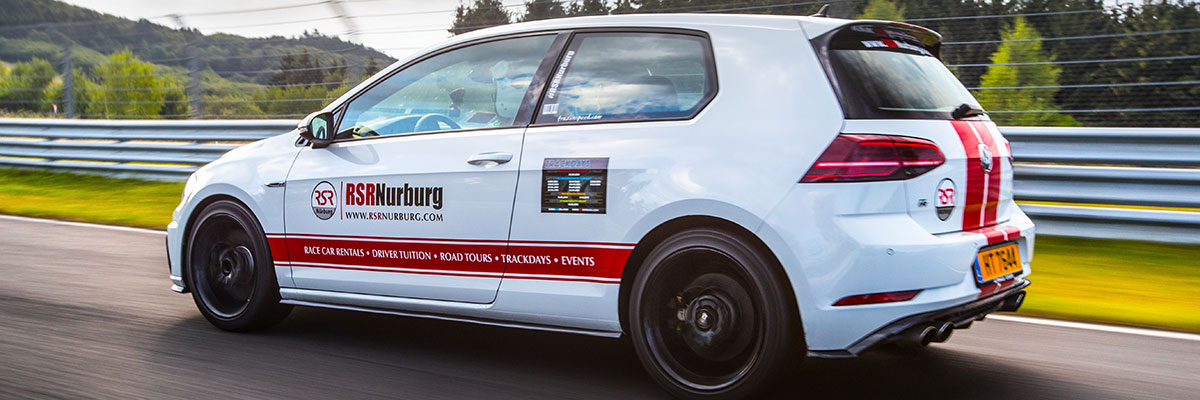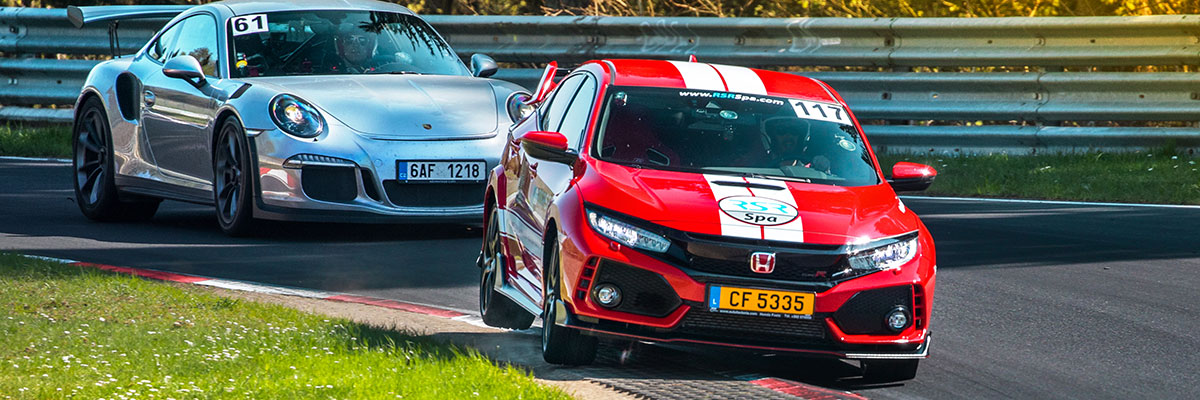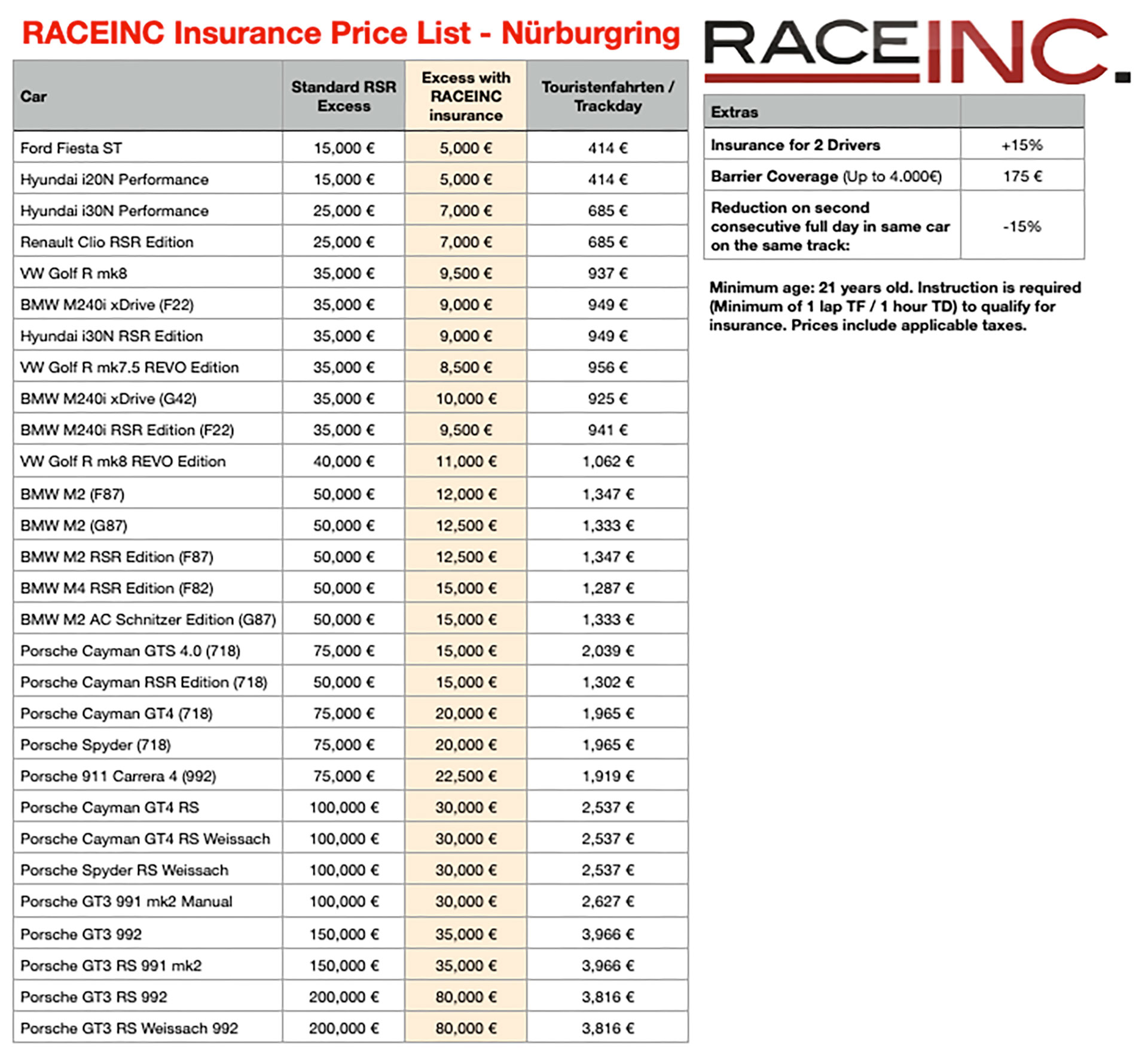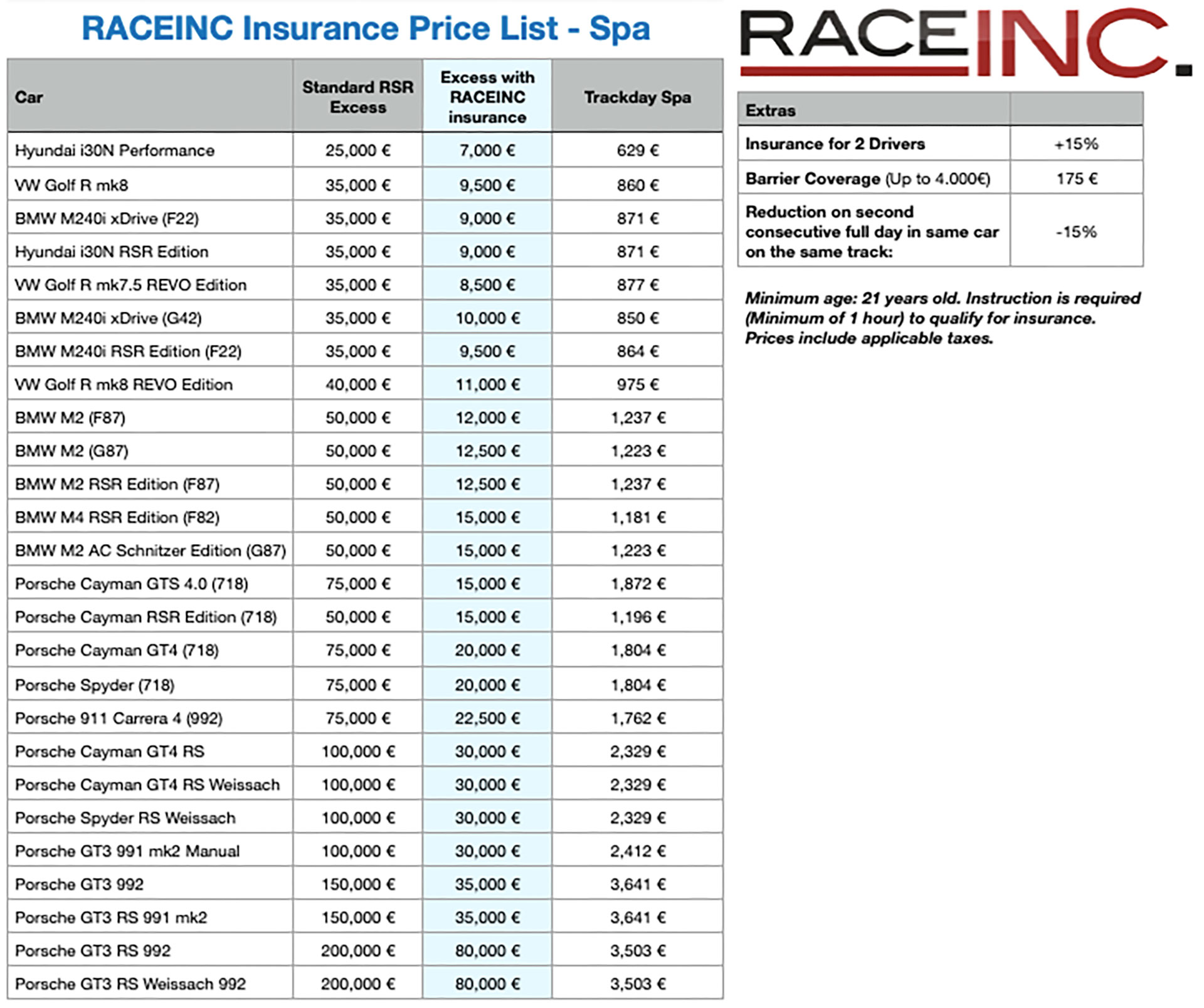
Most people are already aware that the Nürburgring is considered to be one of the most difficult tracks in the world. RSR is dedicated to be as open and transparent in all aspects of hiring a car to drive the circuit, and what happens in an accident is an important part of this. We also think it’s important to be able to offer methods that you can use to reduce the financial risk to yourself when hiring a car from us!
What happens in an accident?
Our cars are insured for the road and track, but like with any normal car insurance, there is an excess that you are liable for before the insurance takes over. So in other words: you pay for the damage you cause to the car (Up to a maximum). This financial risk is normal in any form of motorsport, and while unavoidable, it is also part of the thrill of driving on track. However, there are steps you can take to reduce your risk, which are covered below.
For a full, comprehensive run down of the process and what happens in the case of an accident, please click on the below link:
Are deposits required?
A deposit is a sum of money paid before the rental, that is returned to the client upon a safe return of the car. While most of the companies who hire out cars at the Nürburgring ask for a deposit while hiring a car, for most of our cars under normal circumstances we do not require this. Exceptions to this rule may apply in certain cases:
The deposits we ask for can range from 1.000€ to 20.000€.
Our top-end Supercars are high value cars, and we take a deposit of approximately 10% of the value of the car. These are required regardless of if the cars are insured by a third party or not.
How can I reduce my risk on track?
There are a few important steps you can take to reduce your risk of an accident on track:
Additional Track Insurance for RSR Rental Cars
If you want to reduce your risk on a RSR rental car, in most cases it is possible to organise additional insurance through an external insurance company. You are welcome to organise this additional insurance directly through us at RSR, or you can organise this directly with a trackday insurer yourself. Some of our recommendations are below, as many of our customers have used their services and they are familiar with the needs for hiring a car with us.
Keep in mind that the below companies are only recommendations, and there is no connection or liability between the listed insurers and RSR. You are free to choose other companies. Before purchasing additional insurance, do a thorough analysis and be aware of all terms of the contract, in particular the excess (deductible) conditions and exclusions on the final value to be paid to you.
In the unlikely case of an accident, if you have organised your additional track insurance yourself you still have to pay RSR directly for the damages to the car up to our standard excess – but then there is the possibility to claim some of your money back from the company you were insured with afterwards! If you have organised your additional track insurance through us directly, you are only liable for up to the reduced excess price.
What about insuring my own car?
Many of the below companies also offer insurance options for your own car while driving on the track. Please contact them directly for more options!
Track insurance for RSR rental cars
RSR Preferred Trackday insurance providers
Other Trackday insurance providers
Please note: Additional insurance is best done ahead of time as it may not be possible to organise on the day of rental.

It should already be well understood about the danger and risks of driving on a track. In a sea of indemnity forms and “legal-ese” style sentences, it can be sometime forgotten that driving a car (in fact at any time, not just on a circuit) carries both financial and personal risk!
What can be a bit confusing from time to time, is: what happens if the worst happens? At RSR we do our best to make sure nothing bad happens. We want our clients safe, happy, and wanting to come back again and again. We always give a safety briefing to each and every one of our clients. This makes sure they understand the rules and regulation of the days, and gives you an idea of what to expect. We also ensure everybody wears a helmet on track. There is no excuse for not wearing a helmet. If the worst happens, we want to make sure everything has been done to keep you safe.
In reality, there is no such thing as a dangerous track, only dangerous drivers. Any corner, no matter how sharp, off camber, or low grip, can be taken at an appropriate speed. Getting to know the appropriate speed takes two things: knowledge; and a bit of patience and humility while learning (i.e. take it easy for a while – driving well below your maximum).
We are proud that overall our accident levels are very low. On average only around 1.5% of customers have an accident on track, and even then this is usually only a scuffed wheel or body panel. We take safety and risk very seriously, and do everything we can to make sure that our customers have a great day on track!
If you were to take your own car on the track, it’s likely that your normal car road insurance does not cover accidents while on a race track. Standard road insurers generally have an exception that doesn’t cover the Nürburgring, or any race track. Those that do, normally have a special higher excess level.
This most likely means that all damages you do to your own car on track you would have to pay to repair yourself. Destroy the whole car? Then you’re minus a car, my friend! Of course, additional trackday insurance can cover for accidents like this to reduce your risk further, and these sorts of insurances are still available on our cars. There’s also list of insurers we can recommend at the bottom of this article.
In short: you pay for any damage that you have done to the car – but this is capped to a maximum amount (or excess).
Our cars are insured for the track and the road. But just like any normal insurance, you have to pay for a certain amount before the insurance takes over. This is known as the excess or deductible. However you only pay for damage that you have done to a car – so if you scratch a wheel, then you pay only to repair the damage to the wheel, not the full excess amount. In the VERY RARE case of a large amount of damage (such as a write-off) the maximum you would have to pay is the excess amount, even if the total damage is more.
The excess level does vary per car, and is usually around a half to two-thirds the replacement value of the car – meaning you don’t have to pay for the whole thing! For example, in purchase price alone (see more about this below!) a Hyundai i30N is around 42.000€, however, our excess on the car is 25.000€.
Something to note is that a real world “actual” replacement value isn’t just the purchase price of the car. So while you may be able to purchase a car for one amount, you would also need to add on top items such as:
Depending on the car you choose, the excess can vary! For a rough idea see below, and for a full rundown car by car, check our terms and conditions. Important to remember is that you only pay for any damages done to the car, even if the excess level is higher than the amount of damage.
On the track (This includes the Nürburgring Nordschleife and Nürburgring GP Track during Tourist Driving / Touristenfahrten session)
Public Roads (Road Tours):
The Nürburgring is infamous amongst insurance companies, and as mentioned in the ‘driving your own car on track’ scenario above – usually there is no insurance at all. The difficulty in getting Nürburgring-friendly insurance also applies to companies not just individuals! All of our cars carry insurance for the track – as we need to protect our significant investment (our cars) to ensure that we can continue offering our services to our customers.
We feel the same about our cars, like you would feel about letting someone you don’t know drive your own pride and joy!
So when it comes to an accident, and under our standard excess structure, it’s always better to be liable for only part of the value of the car, and not the whole thing! Even though €50,000+ can seem like a high risk, this is your absolute worst case scenario for liability on our cars – i.e. this is what you’re responsible for if the car is badly damaged or a complete write off.
A fully written off car is very, very unusual, and you only pay for the damage you actually cause.
So in most cases, the above excess level do not apply. We’re not going to charge you €20,000 when you only do €1000 of damage!
However, at the end of the day, you are responsible for how you drive the car. When you are in control, you need to be responsible with your speed and cornering, keeping your wits about you, and seeing what is going on. If you don’t know where you’re going, then drive a bit slower, just like you would on a public road!
For the majority of accident cases, there is no third party involved. Usually, it’s the driver getting ahead of themselves, and “running out of talent”. The other people on track, no matter how idiotic, for most of the time can be avoided by driving defensively, taking no risks, being predictable, and just letting them go on past.
If there is someone else involved, then we have different policies that cover the different situations: Public Road, Touristenfahrten and Trackdays. There is a similar excess-style setup to cover the damage to the other persons’ car.
Third Party:
When it comes to Public Roads and Touristenfahrten, sometimes it’s not apparent whose fault it is in a crash. Police reports can take weeks to come back. When there is a third party involved, and the fault is unsure, then we take the above amounts as a deposit. Anything unused is returned to you once fault is established or repairs are made.
Trackdays are a different story. The rules regarding third parties can vary, depending on the organiser of the event. Generally, there are no public road rules in effect. This means that if any damage is done to another car, they have to pay for their own car. Vice versa, this means that if someone crashes into you, then you are responsible for paying the amount of damage to the car you were driving – even if it’s not your fault. This is why you especially need to have your wits about you around other cars on trackdays. However, some organisers have special rules about overtaking, such as it only being allowed on straight sections of the track, or overtaking by invitation only. If there is a mix up and an accident occurs between two cars, then it’s possibly that fault (or a percentage thereof) may be assigned to one party.
First and foremost let us be very clear: We do not make money out of repairing our cars. And in fact, each of our crash estimates are created through an industry standard program, using industry standard prices. This is presented to you and we take the time to go through each and every item as needed, to ensure that everything is understood.
A quick note on our estimates: they are just that – an “estimate”. Because generally we will not know the final cost of the repair until after it’s been completed, sometimes there are parts that are unable to be determined as damaged until the car is part way through the repair process. In the case of very new cars (Younger than 24 months) with no significant prior damages (cosmetic or under 2500€ in value) then a loss of value to the car will be applied (Wertminderung).
Our cars are used primarily on track and therefore under demanding conditions. Any parts we use to replace on our cars will only be from the original manufacturer or a suitably track-worthy item from a trusted source. Replacing parts with cheap items is not only irresponsible, just think how you would feel if you knew the car you rented had a “cheap” repair job done to it before you rented the car?
So in short:
We think this is fair service to the trust of all of our customers. We hope you agree!
A healthy amount of nerves is good – but of course we still want you to go out there, and enjoy some of the best tracks in the world, with us!
Firstly – You can always drive carefully, within your limits, and drive defensively around other cars on the circuit. Watch what is going on around you at all times – but also concentrate on what you’re doing!
Secondly – Hire one of our experienced driving instructors to help you around the track. It’s great to have a second pair of eyes out there, and they can help you with part of the circuit you’re not familiar with and also keep your driving levels in check!
Thirdly – Hire a car that is within your means. A fast, super expensive car is a nice thing to hire on one of our road tours. But on the track, it means everything approaches quicker than you expect, and if something goes wrong, then you’re normally going faster. When you are very experienced on the circuit, then a faster car can be more rewarding to drive. But when you’re just starting out, it’s always better to work your way up through the levels of car. The morale of the story – don’t drive outside your means!
Fourthly – If the standard excess level is too high, then either consider dropping down a class of car (You’ll generally have just as much fun, with less worry in the back of your mind. Alternatively, you can organise extra track insurance. This is where, for an additional premium another company will cover you for your liability.
At the end of the day, we want all clients to be happy and satisfied with their rental experience. The info above is designed to demystify some of the processes on the side people don’t usually like to talk about – e.g. what happens if it all goes wrong.
You’re doing something inherently risky, that also carries a financial burden – make no mistake about it!
However, the biggest determining factor of risk is your own attitude. Having a responsible attitude is key to having fun, and keeping safe while out on the circuit!
If you have any questions regarding anything, then feel free to contact a friendly member of RSR Staff – we can answer any specific questions you may have.
Please note – Prices and amounts were correct at time of writing. Please ask us for the latest details on the particular car you are interested in renting.
RSR Partner RACEINC offers additional track insurance options for RSR Customers renting a car. With additional track insurance your risk is reduced by lowering your excess liability.
In the event of an accident, you are responsible for damages to the car, up to a maximum amount (the excess). You can choose to go either with the standard RSR Excess, or to reduce your risk down with additional insurance from RACEINC.
This would bring your financial liability down, and reduce the maximum you would need to pay in the case of an accident. You only pay for the damage caused to the vehicle, and this is capped to a maximum amount (the excess).
For example on a Hyundai i30N, the standard RSR excess is €25,000. This means that you are liable to pay damages up to a maximum of €25,000 (For example, in the case of a total loss). With additional insurance from RACEINC, you would pay the additional insurance premium (€685), and reduce your liability on damages to a maximum of €7,000. You can also cover yourself for up to 4.000€ of barrier damages with optional barrier coverage.
Please note: Minimum age: 21 years old. Instruction is required (Minimum of 1 lap TF / 1 hour Trackdays) to qualify for insurance. Prices include applicable taxes. Maximum 2 drivers per policy.
Please Note: Prices are for 1 driver and per day.


Additional Extras |
Price |
| 2 Drivers | +15% |
| Barrier Coverage (Up to €4,000) | €175 |
| Reduction on second consecutive FULL day coverage in the SAME car | -15% |
(Please note pricing may be subject to change without notice.)
For more information and to purchase coverage, please contact us when booking!
Important information: